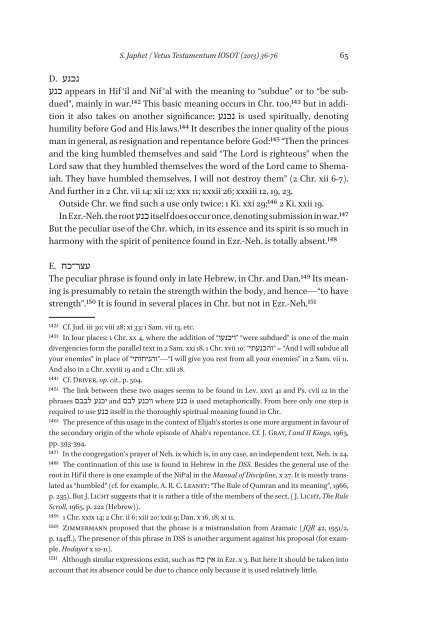Special Issue IOSOT 2013 - Books and Journals
Special Issue IOSOT 2013 - Books and Journals
Special Issue IOSOT 2013 - Books and Journals
Create successful ePaper yourself
Turn your PDF publications into a flip-book with our unique Google optimized e-Paper software.
S. Japhet / Vetus Testamentum <strong>IOSOT</strong> (<strong>2013</strong>) 36-76 65<br />
נכנע .D<br />
sub- appears in Hif ʿil <strong>and</strong> Nif ʿal with the meaning to “subdue” or to “be כנע<br />
dued”, mainly in war.142 This basic meaning occurs in Chr. too,143 but in addition<br />
it also takes on another significance: נכנע is used spiritually, denoting<br />
humility before God <strong>and</strong> His laws.144 It describes the inner quality of the pious<br />
man in general, as resignation <strong>and</strong> repentance before God:145 “Then the princes<br />
<strong>and</strong> the king humbled themselves <strong>and</strong> said “The Lord is righteous” when the<br />
Lord saw that they humbled themselves the word of the Lord came to Shemaiah.<br />
They have humbled themselves, I will not destroy them” (2 Chr. xii 6-7).<br />
And further in 2 Chr. vii 14; xii 12; xxx 11; xxxii 26; xxxiii 12, 19, 23.<br />
Outside Chr. we find such a use only twice: 1 Ki. xxi 29;146 2 Ki. xxii 19.<br />
In Ezr.-Neh. the root כנע itself does occur once, denoting submission in war.147<br />
But the peculiar use of the Chr. which, in its essence <strong>and</strong> its spirit is so much in<br />
harmony with the spirit of penitence found in Ezr.-Neh. is totally absent.148<br />
עצר־כח .E<br />
The peculiar phrase is found only in late Hebrew, in Chr. <strong>and</strong> Dan.149 Its meaning<br />
is presumably to retain the strength within the body, <strong>and</strong> hence—“to have<br />
strength”.150 It is found in several places in Chr. but not in Ezr.-Neh.151<br />
142) Cf. Jud. iii 30; viii 28; xi 33; 1 Sam. vii 13, etc.<br />
143) In four places: 1 Chr. xx 4, where the addition of ”ויכנעו“ “were subdued” is one of the main<br />
divergencies form the parallel text in 2 Sam. xxi 18. 1 Chr. xvii 10: ”והכנעתי“ = “And I will subdue all<br />
your enemies” in place of I“—”והניחותי“ will give you rest from all your enemies” in 2 Sam. vii 11.<br />
And also in 2 Chr. xxviii 19 <strong>and</strong> 2 Chr. xiii 18.<br />
144) Cf. Driver, op. cit., p. 504.<br />
145) The link between these two usages seems to be found in Lev. xxvi 41 <strong>and</strong> Ps. cvii 12 in the<br />
phrases יכנע לבבם <strong>and</strong> ויכנע לבם where כנע is used metaphorically. From here only one step is<br />
required to use כנע itself in the thoroughly spiritual meaning found in Chr.<br />
146) The presence of this usage in the context of Elijah’s stories is one more argument in favour of<br />
the secondary origin of the whole episode of Ahab’s repentance. Cf. J. Gray, I <strong>and</strong> II Kings, 1963,<br />
pp. 393-394.<br />
147) In the congregation’s prayer of Neh. ix which is, in any case, an independent text, Neh. ix 24.<br />
148) The continuation of this use is found in Hebrew in the DSS. Besides the general use of the<br />
root in Hif’il there is one example of the Nifᶜal in the Manual of Discipline, x 27. It is mostly translated<br />
as “humbled” (cf. for example, A. R. C. Leaney: “The Rule of Qumran <strong>and</strong> its meaning”, 1966,<br />
p. 235). But J. Licht suggests that it is rather a title of the members of the sect. ( J. Licht, The Rule<br />
Scroll, 1965, p. 222 (Hebrew)).<br />
149) 1 Chr. xxix 14; 2 Chr. ii 6; xiii 20; xxii 9; Dan. x 16, 18; xi 11.<br />
150) Zimmermann proposed that the phrase is a mistranslation from Aramaic ( JQR 42, 1951/2,<br />
p. 144ff.). The presence of this phrase in DSS is another argument against his proposal (for example,<br />
Hodayot x 10-11).<br />
151) Although similar expressions exist, such as אין כח in Ezr. x 3. But here it should be taken into<br />
account that its absence could be due to chance only because it is used relatively little.








![Am HaSefer [Volk des Buches] - Books and Journals](https://img.yumpu.com/20648352/1/174x260/am-hasefer-volk-des-buches-books-and-journals.jpg?quality=85)







